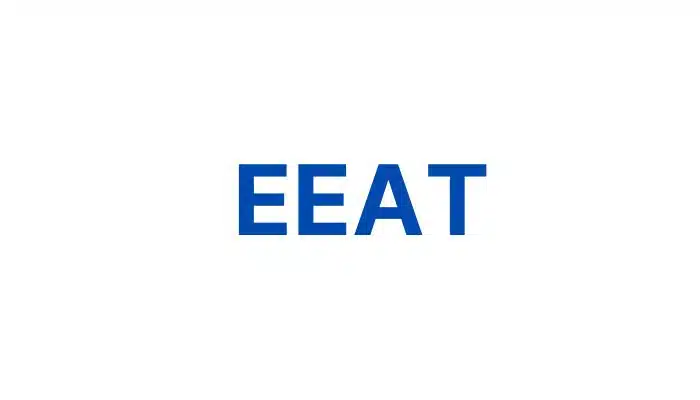The world of SEO is a field in constant evolution, and one of the key pieces to achieve a good positioning in search engines is the EEAT (Experience, Expertise, Authority, Reliability).
This concept, introduced by Google, has become a fundamental factor in evaluating the quality of a website and its content. In this article, we will explore what EEAT is, how it works and how you can improve your website’s SEO by following these guidelines.

The EEAT is a set of guidelines established by Google to evaluate the quality of web pages based on experience, expertise, authority and reliability. These elements are crucial to ensure that the content offered is relevant, useful and reliable for users.
Today, Google strives to deliver high quality and relevant search results. The EEAT Google is a tool that helps to achieve this goal, as it evaluates the author’s experience, knowledge in the subject matter, the authority of the web page and the reliability of the content.
By taking these factors into account, Google can rank web pages more accurately and provide users with relevant, quality results.
The EEAT is composed of four key elements: experience, expertise, authority and reliability. These elements are evaluated by Google’s algorithms to determine the quality and relevance of a web page. Let’s see what each of them consists of:
Experience refers to the author’s experience in the subject matter. Google values content generated by authors with real life experience or knowledge related to the topic of your website.
It is important that the author can bring a unique and personal perspective to the content, which can be achieved through personal opinions, personal experiences and real events.
Expertise relates to knowledge of the subject matter. Google values both experience and in-depth knowledge of the subject matter. It is important that the author has a broad command and knowledge of the subject matter, which can be demonstrated through his or her educational and work history in the sector.
Authority refers to the reputation and trust that users can place in the website. Google takes into account the reputation of the website, the number of inbound links from relevant websites, visits, comments and shares.
A web page with a high authority is more likely to rank higher in search engines.
Reliability is related to the trust that Google has in a website. It is evaluated through the quality of the content, the regular updating of information, the security of the website and the loading speed. A reliable website is more likely to rank higher in search engines.

Now that we understand the key elements of EEAT SEO, let’s look at how you can work on each of them to improve your website’s SEO:
Content is the heart of any website. Make sure you produce valuable, useful and quality content for your audience. Thoroughly research the issues, back up your claims with reliable data and sources, and present the information in a clear and understandable manner.
In addition, it is important to regularly update your content to keep it fresh and relevant.
Show your expertise and authority on the subject through your content. Provide unique information and perspectives that demonstrate your knowledge and experience in the area. Consider including authors’ biographies and credentials on your website to support their expertise.
In addition, actively participate in online communities related to your industry, share your knowledge and establish connections with other professionals.
Quality links from other relevant websites can help increase your site’s authority. Work on building a network of natural, high-quality links by publishing shareable content and collaborating with other experts in your industry.
Also, make sure you have internal links that connect your pages and improve user navigation.
User experience is an important aspect for EEAT. Make sure your website is easy to navigate, fast to load and provides an overall positive experience.
Optimize the design, structure and usability of your website to improve user satisfaction. In addition, pay attention to optimization for mobile devices, as more and more users are accessing the Internet from their smartphones.
Actively participate in online communities related to your industry. Share your knowledge, answer questions and make connections with other professionals.
This will help build a solid online reputation and support your authority on the subject. Also, encourage your users to leave positive reviews and testimonials on your website, local directories or relevant industry platforms.
Make sure your website has a clear structure and easy navigation. Organize your content into relevant categories and subcategories, use internal links to connect pages and facilitate user navigation. This will help search engines understand the structure of your site and index your pages correctly.
The loading speed of your website is a crucial factor for user experience and EEAT. Optimize the performance of your website by compressing images, reducing unnecessary code and using a good hosting infrastructure.
Fast loading not only improves the user experience, but is also valued by search engines.
Reviews and testimonials from satisfied users can help strengthen the reputation and trust in your website. Encourage your users to leave reviews and testimonials on your site, local directories or relevant industry platforms. These reviews can influence the perceived authority and trustworthiness of your site.
Structured data markup is a way to provide additional information to search engines about the content of your website.
By using appropriate markup schemes, such as Schema.org, you can help search engines better understand your site’s content and display rich results in search results.
SEO is an ongoing and constantly evolving process. Regularly monitor the performance of your website using tools such as Google Analytics and Google Search Console. Analyze the data and make adjustments as necessary to improve your search engine rankings.
The EEAT (Experience, Expertise, Authority, Reliability) is a set of guidelines established by Google to evaluate the quality of web pages. These elements are essential to ensure that the content offered is relevant, useful and reliable for users.
Working on the EEAT can help you improve your website’s SEO and achieve greater visibility in search engines.
Remember that SEO is an ongoing process and requires time and effort. Follow the EEAT guidelines, produce high quality content, demonstrate your expertise and authority, build quality links and improve the user experience.
Regularly monitor your website and make adjustments as needed. Over time, you will see your website improve its search engine ranking and attract more organic traffic. Don’t give up and keep working on your SEO strategy!
If you need help to improve the positioning of your website, in Kiwop we have professionals in the area. Do not hesitate to contact us!
If you want to have the website you want or increase the online visibility of your brand, we know how to do it.
Shall we start today?
Leave a Reply